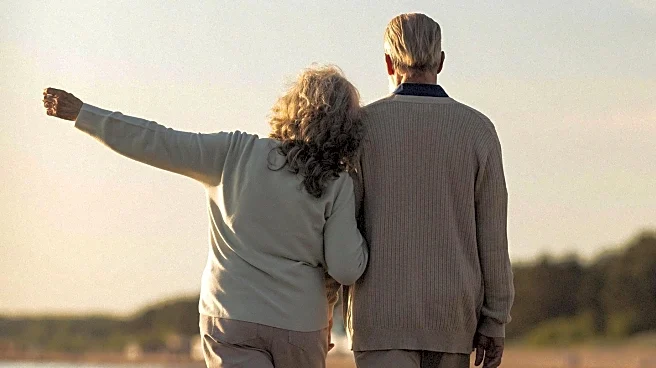What's Happening?
Recent research challenges the traditional narrative of aging, suggesting that individuals in their 70s can experience their happiest decade by adopting specific daily habits. These habits include continuous learning, prioritizing relationships, integrating movement into daily life, maintaining consistent sleep schedules, engaging with purposeful activities, and mastering the art of letting go. The concept of cognitive reserve, which acts as a buffer against age-related changes, is central to this approach. By treating learning as a daily necessity, maintaining strong social ties, and ensuring constant movement, individuals can enhance their brain health and overall well-being. The emphasis is on simple, consistent practices rather than extreme measures, allowing for a fulfilling and vibrant life in later years.
Why It's Important?
The significance of these findings lies in their potential to reshape societal perceptions of aging. By demonstrating that the 70s can be a period of growth and happiness, this research offers hope and practical strategies for older adults seeking to improve their quality of life. The habits outlined not only contribute to physical health but also enhance mental and emotional well-being, reducing inflammation and stress while strengthening immunity. This approach encourages older adults to remain active and engaged, fostering a sense of purpose and connection that is crucial for longevity. As the population ages, these insights could influence public policy and healthcare practices, promoting a more positive and proactive view of aging.
What's Next?
The next steps involve broader dissemination of these findings to encourage adoption of these habits among older adults. Healthcare providers and policymakers may consider integrating these practices into wellness programs and community initiatives aimed at supporting aging populations. Additionally, further research could explore the long-term effects of these habits on cognitive reserve and overall health, potentially leading to new interventions and support systems for older adults. As awareness grows, there may be increased demand for resources and opportunities that facilitate learning, social engagement, and purposeful activities for individuals in their 70s and beyond.
Beyond the Headlines
Beyond the immediate implications, this research highlights the ethical and cultural dimensions of aging. It challenges ageist stereotypes and promotes a more inclusive and respectful view of older adults, recognizing their potential for growth and contribution. The focus on simple, sustainable habits also aligns with broader societal shifts towards wellness and preventive health, encouraging individuals to take proactive steps in managing their aging process. This perspective may inspire younger generations to adopt similar practices early on, fostering a culture of lifelong learning and engagement.









